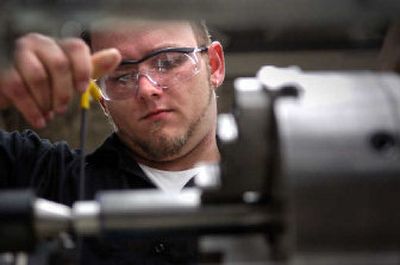Program puts students on right path

A few months ago, Patrick Berner was unemployed but working towards his GED. He had dropped out of high school at age 16. Most of his work experience was in customer-service jobs like fast food and auto detailing.
Then he walked into Career Path Services.
On Sept. 12, thanks to a Career Path referral, the 25-year-old entered the I-BEST program, short for Integrated Basic Education and Skills Training. That’s a mouthful for the hope I-Best gives those who, like Berner, dropped out of high school, or those for whom English is a second language. The combination of remedial academics and instruction in basic manufacturing skills should put graduates of the two-term program in a good-paying job, or position them for additional, specialized training.
“It’s an awesome program,” says Berner, who has taken to the hands-on instruction in a way he never did in more structured classroom settings.
Although nervous when he ventured onto the Spokane Community College campus, Berner says he has been reassured not only by the one-on-one teaching, but also by support from the 20 other students enrolled this quarter.
They split the four hours of evening classes between adult education and shop skills like measuring, reading blueprints and using tools. During the second quarter, students learn how to find a job, and they also begin to focus on specialties like welding, machining and hydraulics.
Of the 14 students who enrolled in the first classes last spring, 10 found jobs in Spokane’s manufacturing sector and four decided to continue their studies in SCC’s two-year vocational programs. Completing the I-Best coursework earns students 25 college credits.
I-BEST is a state-funded program that dovetails with an initiative of the Spokane Regional Chamber of Commerce Manufacturers’ Roundtable. Concerned about the shortage of young workers to fill new positions and replace retirees, the group wanted to create a certificate of basic manufacturing to tell employers that holders are ready to work in a shop environment.
Roundtable Chairman Mike Marzetta says 45 area companies were surveyed to determine what skills they wanted in applicants. Most are so busy they cannot set aside time to do much training on their own, he says.
Marzetta, president of Altek Machining & Molds Inc., says his company was desperate for machinists. Not only has he hired at least one I-BEST graduate, he also has enrolled five of his workers to increase their training.
“It’s been a real jump start for us,” he says, adding praise for SCC’s willingness to design a program that addresses non-traditional students. “We’re getting exactly what we asked for,” he says.
Marzetta’s main concern is that the curriculum may become too rigid to adjust to the demands for new skills as early graduates begin to fill the pipeline for those already identified.
“There’s a lot of credibility at stake creating a program you can’t get jobs for,” he says.
Molly Popchock says SCC is alert to the possibility industry needs may change. Popchock heads the SCC Institute for Extended Learning’s English as a Second Language program.
“We want the model to be mobile,” she says, noting there has already been some discussion of training oriented towards the medical community.
Mike Mires, dean for technical education, says the SCC version of I-BEST is already becoming a model for similar programs around Washington. Although in its infancy, he says, “It’s got tremendous potential.”
Meantime, the program will double to two sections in January to satisfy demand for the present curriculum.
Popchock says experience so far has allowed the program to sharpen its pre-screening to assure applicants have the potential, especially in mathematics, to succeed.
She says I-BEST has latched on to students who might otherwise never have overcome early setbacks in school or the workplace. Minor incidents like the loss of a driver’s license can trigger a series of reversals that sap an individual’s confidence, she says.
Show them the way to a good-paying job and give them training that engages them in ways conventional classrooms never did and their whole outlook turns around.
“I don’t know what would have become of them,” Popchock says. “I know this is a life-changing thing.”
Berner, just two months into the program, says he already feels his life turning around, and not just in terms of future employment.
He says he may take his education even further once he completes his second term in I-BEST.
“It’s really sparked my interest in things,” Berner says.
What could be I-BETTER?